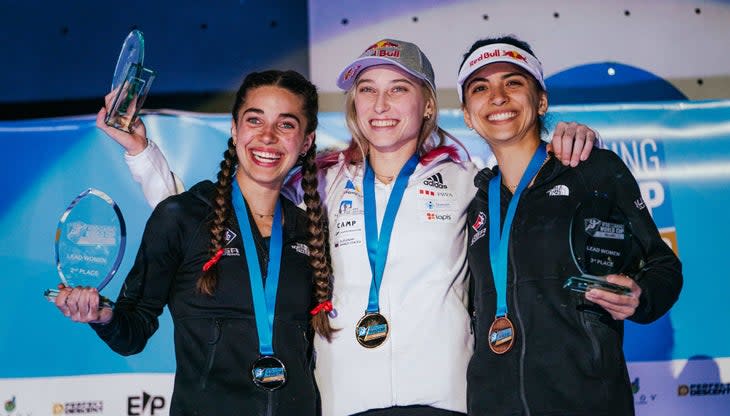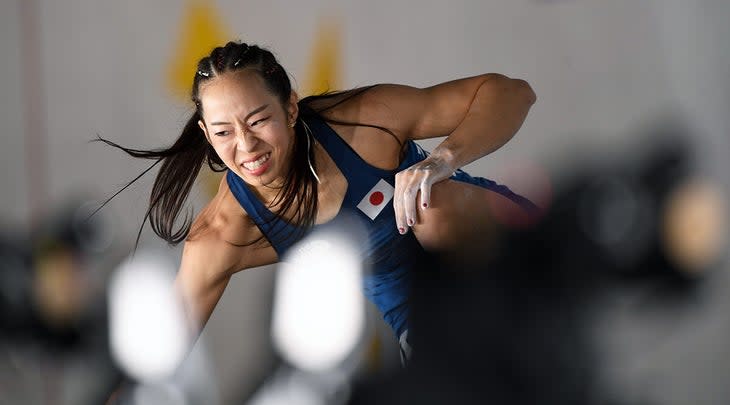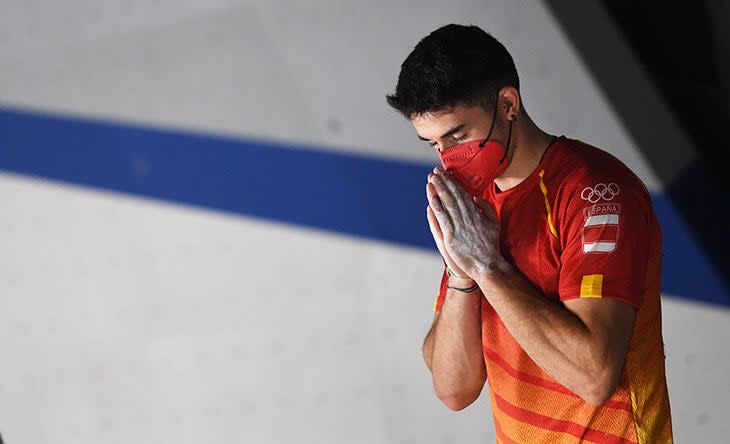Climbing Lived Up To The Olympics. Now What?
- Oops!Something went wrong.Please try again later.
- Oops!Something went wrong.Please try again later.
- Oops!Something went wrong.Please try again later.
This article originally appeared on Climbing
It doesn't seem like that long ago when the 2019 World Championships concluded in Hachioji, Japan, and climbing fans around the world were presented with their first cohort of Olympic qualifiers--Slovenia's Janja Garnbret, Team USA's Brooke Raboutou, and Canada's Sean McColl among the earliest to earn Olympic berths. It also doesn't seem like that long ago when fans were embroiled in debates--heated, at times--about the pros, cons, and complexity of the Olympics' proposed "Combined" format, which was to conjoin Speed, Boulder, and Lead disciplines into a single successive event. How could we forget the Czech Republic's Adam Ondra describing the combining of the three disciplines as a "circus" back then and denigrating speed climbing by calling it an "artificial discipline?" Understandable, emotions were high, and so too were the Olympic stakes.
Yet, at the same time, now that climbing's Olympic debut--which took place officially one year ago this week--is in the rear-view mirror, it feels like the Tokyo Olympics took place in a wholly different era. That three-discipline Combined format from Tokyo seems to be gone forever, replaced by a format for the 2024 Olympics in Paris that will combine just two disciplines (Boulder and Lead) and leave the Speed discipline as its own separate entity. Also, everyone knows that the Tokyo Olympics were originally scheduled for the summer of 2020 but postponed for a year due to the COVID-19 pandemic...and rife with ultra-stringent restrictions and mitigation strategies. Hopefully such widespread COVID disruptions of life and leisure are gone forever too. See, it already kind of feels like the Tokyo Olympics were not a fairly recent happening, but some intriguing rarity that's annotated in a history textbook.
Whether the Tokyo Olympics feel recent or long ago, there's no denying that they changed climbing. On a base level, they brought more eyes to the sport than ever before. (Some reports indicate that the Tokyo Olympics were watched by more than three billion people.) Amid that, the Tokyo Olympics recalibrated what it means to be a competition climbing superstar. Consider that in the early 2000s, competition climbers received coverage almost exclusively from endemic media outlets like, well, Climbing. Compare that to the media entities that reported on the Olympic journeys of Janja Garnbret, Brooke Raboutou, and others--NPR, CNN, The New York Times, The Wall Street Journal, ESPN, etc. For lack of a better word, the Olympics made competition climbing mainstream news in a way the sport and its athletes had never been before.
As an extension of all that big media coverage, the Tokyo Olympics popularized competition climbing's various disciplines. It's probably too early to gauge any long-term metrics, but a quick Google search shows a heckuva lot of articles from this past year in the vein of Yahoo's What the Hell is Speed Climbing? The Tokyo Olympics are solely responsible for such widespread curiosity. And shortly after the Tokyo Olympics, writer Michelle Bruton noted in Forbes that "interest [in climbing] has spiked to an all-time high."
But all of that is a more panoramic view of how climbing has changed over the past year, gazing outward rather than inward. What about the Tokyo Olympics' climbers themselves? It might sound a bit extreme to play a game of "Where are they now?" after just one year, but there's also no better time than this one-year anniversary to look at how the field of competitiors has changed and grown.
Climbing better than ever
From a global perspective, the biggest star to emerge from the Tokyo Olympics was also the biggest star heading into them--Slovenia's Janja Garnbret. In fact, Garnbret's greatest Olympic accomplishment was likely that she was able to be so heavily favored in the media before the Games--almost to an unfair degree--and still deliver on all the hype. Other competitors likely would have caved under such pressure, and there would not have been any shame in that. But Garnbret managed to harness the immeasurable expectations into something magical--the first-ever women's Olympic gold medal in climbing, and the third-ever gold medal for a Slovenian woman at a summer Olympics.

In this year following the Tokyo Olympics, we have seen that such an immaculate gold-medal performance came with a price. After taking part in the first Boulder World Cup of the current 2022 season, Garnbret chose to take a hiatus from competition climbing, specifically citing the physical and mental toll the Olympics had taken on her. But she returned for the start of the Lead World Cup season in late-June, seemingly mentally refreshed and per formatively better than ever. So far Garnbret has won every Lead World Cup of the 2022 season and is widely considered to be the greatest competition climber ever. Suffice to say, she has continued to crush since the Tokyo Olympics.
Another Tokyo Olympian who is currently performing better than ever on the World Cup circuit is Team USA's Brooke Raboutou. Since placing fifth at the Olympics, Raboutou has stood on three Boulder World Cup podiums and two Lead World Cup podiums. What's particularly compelling is that Raboutou is inching closer and closer to Garnbret in results. Case in point: At this year's Lead World Cup in Villars, Raboutou earned a silver medal, narrowly beaten in the final round by Garnbret.
South Korea's Chaehyun Seo has followed a similar trajectory, improving greatly since advancing to the finals at the Tokyo Olympics. Once considered a specialist in the Lead discipline, Seo has broadened her skill set--particularly this season--and advanced to the final round multiple times in Boulder World Cups. The fact that Seo is only 18 years old makes her--along with Garnbret and Raboutou--one of the early favorites for qualifying for the forthcoming 2024 Olympics. The same could be said for Team USA's Colin Duffy, also 18 years old, who followed up his appearance in the Tokyo Olympics last summer by historically earning gold medals in both the Boulder and Lead World Cups at Innsbruck this year.
Riding off into the sunset
As much as Garnbret, Raboutou, Seo, and Duffy made the Tokyo Olympics a jumping-off point for newfound success, other competitors made the Tokyo Olympics the ultimate conclusion. In particular, Great Britain's Shauna Coxsey and Japan's Akiyo Noguchi retired from elite-level international competition following the Tokyo Olympics. "After years of being ready, years of preparation, off-seasons spent fighting to get to the start line, years of harnessing the desire, the determination and the belief, it feels so wrong to admit I no longer want to do competitors," Coxsey, who had battled several injuries in the lead-up to the Olympics, revealed at one point.

Noguchi's retirement was noteworthy because she earned a bronze at the Tokyo Olympics, proving that she was still in her performative prime when she chose to gracefully exit. Noguchi had also made a World Cup podium the year before the Tokyo Olympics, and she had been one of the competitors to pose the biggest challenge to Janja Garnbret throughout the 2019 Boulder season--which Garnbret eventually swept.
But Noguchi's retirement from the competition scene also left a figurative void for the Japanese team. To many fans, Noguchi was viewed as the longtime athlete-leader of Team Japan and a savvy veteran that helped guide the team's teenage rising stars--Ai Mori, Natsuki Tanii, and others. Whether Noguchi has continued to aid and mentor the young members of Team Japan in retirement is unknown, but it is generally accepted that no other national squad has the elite depth that the Japanese team has. Many expect one of Noguchi's mentees, 25-year-old Miho Nonaka (who earned the silver medal at the Tokyo Olympics) to assume the athlete leadership role in Noguchi's absence. If this season's World Cup results (i.e., medals) are any indication, the Japanese Team has managed to handle the void left by Noguchi just fine.
Residing in the Unknown
Still, a majority of the Olympian climbers have not necessarily surged to even greater heights or faded into retirement over the past year. Instead, they are currently residing in a nebulous space--often due to circumstances out of their control or simply bad luck. For example, Canada's Sean McColl suffered a shoulder injury at one of this year's World Cups in Salt Lake City and has not participated in a competition since then. Also, Team USA's Nathaniel Coleman, silver medalist at the Tokyo Olympics, revealed he's dealing with a "bum finger" and has not taken part in any World Cup since April. Germany's Jan Hojer admitted to dealing with some finger injuries last year and is yet to take part in any World Cup this season; his last elite-level international competition was the 2021 World Championships nearly a year ago.
Yet, the most significant injury is likely that of Alberto Gines Lopez, since he is the competitor who won gold in the men's division at the Tokyo Olympics. Currently dealing with a tweaked finger of his own, Gines Lopez took part in four World Cup this season but has been absent from the circuit since May to rehab the finger.

Additionally, Austria' Jakob Schubert--the bronze medalist from the Tokyo Olympics--had his participation in the 2022 World Cup season altered when he contracted COVID shortly before the start of the Chamonix World Cup in early July. "Almost thought I can get around Covid," Schubert wrote on Instagram, "but no, it now got me as well.
Adam Ondra and several other athletes have also had their current World Cup season disrupted by positive COVID tests promptly after World Cup events. It's presumed that Ondra and most other competitors in the upper echelon of the current World Cup circuit will at least make some attempt to qualify for the next Olympics, although most are staying tight-lipped about specific Olympic plans and goals at this juncture.
Above all else, the Tokyo Olympics gave everyone a roadmap for the Olympic and post-Olympic frenzy; we now know what kind of hype to expect in the lead-up and the wane. We know there will be Highs and Lows, promotion and puffery, fun and funkiness for all involved. And, lest you think that we have a lot of downtime until the hype ramps up for those 2024 Olympics, let's conclude with the fact that their Olympic qualification pathway begins next season--approximately one year from now. In other words, it's almost time to do it all again.
For exclusive access to all of our fitness, gear, adventure, and travel stories, plus discounts on trips, events, and gear, sign up for Outside+ today.

